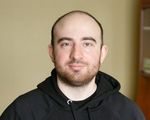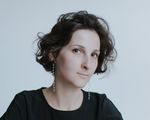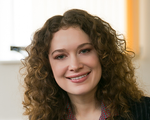About Success Builder
How do you find your place in life? How do you find something to do that both comes naturally to you and makes you happy? The answer is that you have to apply the knowledge you’ve gained from university and from life itself correctly. The Success Builder Project features HSE University graduates who have discovered themselves through an interesting business or an unexpected profession. The protagonists share their experiences and lessons learnt and talk about how they’ve made the most of the opportunities they were given.
Maria Petrova, who holds a bachelor’s from HSE University Perm and a master’s from the HSE ICEF programme, is a department head at Sovcombank. She developed a course for master’s students at NES and ICEF that helps students learn the challenges of the industry and field job offers even before graduating. In this interview with Success Builder, she explains which qualities a beginner needs to work as a bank analyst, how to pick up leadership skills at the workplace, and why Sovcombank trains its own staff.
Why did you want to study economics?
At school, I liked mathematics and the exact sciences in general. I thought about where I could apply my knowledge and economics seemed to be an interesting field, both from a social and mathematical point of view. I remember that at school, we took a tour of a metallurgical plant where I saw what real manufacturing is and I decided that an engineering education was definitely not for me. I also thought about studying mechanics & mathematics, but for some reason I was sure that this was an education for boys and out of touch with life as well. All this led me to the idea that the financial sector would be an interesting application of my abilities.
I was told that economists and lawyers were a dime a dozen, but I hoped to be an exception to this rule. I grew up in the Perm region and HSE University opened a campus there not long before I graduated from school. It was the most innovative university, had powerful marketing, and taught English superbly, which was an advantage because I had received strong language training in school. HSE University graduates have excelled in a variety of areas, from business to science. All this convinced me to attend the best university available. I had an amazing experience there: I made a huge number of friends, became immersed in a foreign language, studied under the best teachers and, in general, benefited from the highly charged atmosphere that so distinguishes HSE from other universities.
In this way, I spent four wonderful years and became very familiar with the HSE University campus in Moscow where I attended conferences. I began to envision new opportunities and prospects for myself, so I gave serious thought to enrolling in a master’s programme in Moscow. At that time, I had little experience in the financial sector, but I wanted to expand my knowledge and put myself on better footing professionally.
Why did you consider a master’s degree useful in this regard?
I wanted more awareness in choosing a profession and broader prospects. In the first couple of years of undergraduate studies, the student begins to grope around for a sense of what economics is, but only gains a partial understanding of how this knowledge actually works towards the end of the fourth year. You start doing internships, conversing with alumni and gathering information. By that time, I knew for sure that I didn’t want to be a corporate accountant or economist who spends time creating budgets in Excel. I was lucky: in my third year, I wrote a term paper under Igor Zakharov. He taught econometrics for undergraduates and spoke about financial markets in their most complex form, which seemed very interesting to me. I dared to ask if he would oversee my term paper. He looked down at me, asked me to read a pile of books, but agreed.
I didn’t think that the term paper could be so difficult, but it turned out to be a year of challenges. The topic was related to stock markets and stocks and required complex modeling. Still, I like wading through new information and challenges and, as a result, I received a recommendation from Igor Zakharov for an intern position as an analyst in a company that, as it happened, specialised in working in the stock markets.
While my classmates on internships were pushing papers at desk jobs, I dived into the very thick of it, where the industry was struggling with the consequences of the 2009 crisis
Everyone around me was talking about the financial problems of the eurozone, the bankruptcies, the default in Greece and the U.S. national debt. For me it was a window to the world. After that, I clearly understood what I wanted to get from my education. All that remained was to choose a programme and move, since life in Moscow clearly provided more opportunities for a career. I also wanted new knowledge, significantly different from that which I had received from my bachelor’s degree.
I studied all the master’s programmes available in Moscow and realised that only ICEF was, by any standard, the most advanced and offered the possibility of obtaining a second, international, diploma. I liked that the programme had an international team of teachers and that all the instruction was in English. This is the international language of economics, which means that you are integrated into the global structure of the industry while still a student. For this reason, I determined that Financial Economics was the ideal choice, so I did not apply anywhere else.
How was the transition from Perm to the Moscow campus?
It’s great that all HSE branches preserve the university’s unique atmosphere. In this regard, I was ready for my studies, in terms of both the teaching style and the requirements—and, in general, with regard to what you might call the university ethics. The relationship between students and teachers, respect for the opinion of those who are younger and the willingness to support them not only within the framework of their studies, but also in their lives in general, has always seemed special to me. I love and appreciate ICEF precisely for this special warm atmosphere, where they care for you, try to eliminate bureaucracy, give you freedom, teach you how to make quality choices, and build the educational process in a way that is most convenient for you.
I can say that in terms of the workload and in-depth study of the subject matter, my studies at ICEF were not easy and represented a completely new level of difficulty.
It’s great that the university doesn’t let you relax, but only stimulates you and causes you to draw on your hidden reserves
Mathematics and every related subject required a huge amount of effort and time, although in Perm I had managed to get perfect grades. The requirements for students are high, and the programme itself is difficult. The experience I gained while writing a term paper with Zakharov came in handy at the start of my studies here. After the first session, you get used to the load; you overcome this barrier, and it is easier to study further. The main thing is to submit everything on time.
At ICEF, you worked in the Laboratory of Financial Economics. How was that experience useful?
I worked as an assistant and learned, first, how to collect and analyse data and build basic models from it. I also gained good research experience in terms of how to write articles according to international academic standards. In general, I joined the community of scientists and mastered research methods. Now I am an analyst, even a researcher in some ways. I work with a large amount of information on markets and companies and benefit from the structured approach to problem-solving that I developed while still at the university.
Research skills are certainly important in work—not only in finance, but also in any other field. But one must understand that in terms of goals and applied value, academic research and analytics in the real sector are two different things. While still studying, students need to learn how to work in both areas—for example, by solving case studies together with industry representatives.
Does it help to have research experience on your résumé when applying for jobs in the banking sector?
Of course, they consider experience. Banks usually look first at where the candidate studied and how prestigious his or her university and programme are. But when the résumé has passed the screening stage, a more detailed study of the candidate begins. Now they consider various activities such as research, work experience in laboratories, teaching, participation in competitions and conferences, academic performance, etc. For example, we really appreciate it when a student has managed to pass the first CFA level. We consider it a sign of professionalism and motivation. In general, we see that a diverse set of skills indicates that a person can solve different problems at the same time and has relevant experience—even if it isn’t in industry, but at the university.
You started your career as an analyst at VTB Bank. Did you like it right from the start, or did you have doubts about your chosen field?
At VTB, I got into an internship programme with a difficult selection process: out of 1,000 candidates, only a few dozen interns are chosen. During several stages of interviews, various departments of the bank consider you as a potential employee. In my case, perhaps my experience in Perm played a role because I was made an analyst in asset management and at first, I performed the usual tasks. In general, I liked working in a bank. The main difficulty was adapting to such a huge and complex structure as VTB: after the club-like atmosphere at ICEF, where everyone is friends and looks out for each other, you become a cog in a big financial machine. Psychologically, this requires time and effort; you need to be prepared for the many aspects of such work—obtaining endless approvals, bureaucracy, limited duties, etc. This was one reason why I left for a smaller bank after working at VTB for three and a half years. I was able to expand my range of duties and learn from the new and interesting responsibilities. The whole world opened up before me.
What did Sovcombank offer you in terms of new tasks and opportunities?
I went there in 2016 when it was five times smaller than it is now in terms of assets and structural complexity. It turned out to be a very interesting time in terms of tasks. Many departments of the bank were just emerging, there weren’t many analysts, and although I was coming from a godforsaken department at VTB, I was made chief analyst and became part of the bank’s management. This couldn’t help but motivate me.
At Sovcombank, I was amazed to see that the bank made key decisions based essentially on my expertise
I interviewed immediately with the shareholders of the bank, which struck me as new and unusual. What’s more, the bank grew at an astronomical speed and I developed rapidly along with it. When I arrived, there were only two analysts working there; today there are about 50 of us and Sovcombank is one of the largest financial institutions in the country. Now I lead the entire analytical team: we research the markets of various commodities, analyze the macroeconomics of Russia, other countries and the largest global and Russian companies, look for interesting ideas in stocks and bonds, and much more. The work is both highly responsible and extremely interesting.
Which skills, besides specialised ones, does a leader need?
In my case, innate skills played a significant role. For example, I was never afraid to make decisions; I didn’t foist responsibility onto others and tried to deal with each task myself, as well as take responsibility for the result, even when it was negative. In addition, you gain management skills at the university and at work. I looked a lot at the work experience of older and more successful coworkers and adopted their management practices.
In Sovcombank, new skills came to me organically, in the sense that there were role models from whom I could learn. People near me made multi-billion dollar decisions every day; I analysed their thinking and drew conclusions, and this helped me understand the basis of many economic processes.
In addition to making decisions and taking responsibility, it is important to be able to interact with the team by motivating the people around you, inspiring and encouraging your coworkers, and assigning varied and interesting duties so that each employee works effectively and develops. This is no less difficult. I don’t want to brag, but I do seem to be able to cope with this by virtue of my natural empathy and communication skills. I am also constantly learning myself.
Which unique real-world experience prompted you to teach NES students?
In 2021, when I first headed the bank’s credit analysis, there was a boom in retail investments, the market was growing, and there was a shortage of both analytical and financial personnel. Finding a new analyst to join the team proved to be an almost impossible task. People came with little experience, but still demanded a lot. The situation in the banking sector has changed a lot over the last 10 years. After the mass layoffs in 2014, the prestige of working in finance fell. At the same time, the IT sector began to grow rapidly and many good specialists went there.
Then we had the idea to educate analysts on our team. This is how the position of junior analyst appeared at Sovcombank, where we began to recruit people from economic universities—and not only to recruit, but also to train. At the university, students receive mainly an academic foundation, and we help them master important applied aspects in the field of economics and finance. At the same time, we prepare future employees and give graduates a job in their specialty. Thus, we became friends with ICEF, MGIMO and NES, where we were invited to teach a course for undergraduates. I am the co-author and teacher of this course.
What was it like for you as a lecturer?
I really like teaching; I like to communicate with students: they are bold, active, express fresh ideas and help me look at familiar tasks in a new light. You think that you know everything, but suddenly you are bombarded with questions and start a discussion that ends up giving you a huge boost of energy. Unfortunately, many of my colleagues from the industry are not as interested in coming to universities and sharing their expertise. I am glad that our bank is interested in this; I had the mission of educating personnel, and I consider it my second profession.
For me, a big advantage of the teaching work is also that it develops me as a person. I am not a nerd analyst who communicates only with numbers, but someone who knows how to defend her opinion before an audience, owns an argument and qualitatively supports discussion of the issues in the professional community. Thus, over the three years of the course and the internship program, we recruited eight junior analysts who have become an important part of our team and are successfully moving to senior positions. Now, other divisions of the bank are asking us to bring them smart people. It makes me very happy.
Your course on investment analysis also became available to ICEF students recently. How will it be useful for them?
The course will last until the end of the academic year. We talk about the work of various departments of the bank, the work of an analyst, the features of different industries and financial instruments, the financial world and much more. As part of the course, I give lectures on the analysis of oil, gas and energy and my colleagues supplement that with information about different industries, macroeconomics, etc. according to their experience. Also, students study real cases from the investment field and get feedback from us. Investment analysis is one of the key topics for a banking specialist and bank analysts are good at it and can teach it.
We work with various financial instruments—mainly with bonds and stocks—explain how to analyse a certain industry, how to look for investment ideas in it, and also what features of work exist within the framework of the economy of different countries. In fact, the course is based on the bank’s own experience. It will be useful for students to understand the details of an analyst’s job: this will help them consciously choose their future position and ensure a successful career start, as well as master the field of financial markets and investments from a practical point of view. After the course, the most motivated and diligent students will receive offers from Sovcombank. In any case, even if a student does not want to work with us, the course will be useful to any novice employee in the banking or other field, as well as those who want to invest.
By the way, for those who are interested in investments, I can’t help but recommend Market Power. Like the course I mentioned, this is another brainchild of our team of analysts. It includes comics about stocks, videos and a Telegram channel about stock markets.
How do you think HSE University students differ from the students of other universities?
Of course, as an HSE University graduate, I am accustomed to looking at the world through the prism of certain values that I hold dear. I see similar qualities in HSE students and appreciate them very much, so I trust the university as a place to train not only good specialists, but also well-rounded people. I know that the ICEF programme is challenging and that its graduates really study hard and aren’t here just for the diploma. The same goes for NES students. For me, as an employer, these universities have become a certain standard for selecting candidates. If a student is able to graduate from HSE University, it means that he or she is a great specialist and knows how to study and work. The tasks of an analyst are not easy, so you need to gain new experience constantly, and for this position, the ability to learn is a very important skill. In addition, HSE University graduates are enthusiastic. If they have a desire to grow, then there will always be demand for them, and from the best places.














































































































































